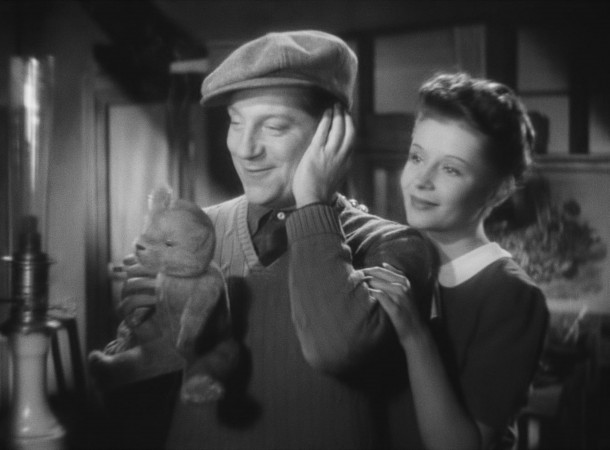
Cast: Jean Gabin, Arletty, Jules Berry, Jacqueline Laurent; France 1938, 86 min.
Between 1937 and 1953 the duo of director Marcel Carné (1906-1996) and writer Jacques Prevert (1900-1977) created more or less the canon of French poetic realism, and later the French version of film noir. LE JOUR SE LÈVE (1939) is perhaps their greatest achievement, though some might prefer the opulent “Les Enfants du Paradis”. But these two artistic collaborators were not alone responsible for the success of LE JOUR SE LÈVE: The Production Designer Alexandre Trauner had already worked with Carne and Prevert on Drôle de Drame (1937) and Les Quai des Brumes (1938). He had fled anti-Semitic Hungary in 1929, and worked for fellow emigres like Wilder and Zinnemann in the USA, apart from collaborating with Orson Welles, Joseph Loosey, Luc Besson and John Huston, his greatest achievement being Jules Dassin’s “Rififi”. Curt Courant (1899-1968) was the DOP, he had shot Fritz Lang’s Die Frau im Mond (1929), and after his emigration from Nazi Germany Hitchcock’s The Man who knew too much (1934) and would end his career with Charles Spencer Chaplin’s Monsieur Verdoux (1947).
LE JOUR SE LÈVE is told mainly in a flashback. At the start of the film we hear a shot, and then a well-dressed man tumbles down the stairs of a block of flats in a working class suburb of Paris. The block just exists as a corner piece, it will be soon be demolished like the rest. In one of the flats, high up, we see Francois (Gabin), who has killed Valentin (Berry), a man of the middle classes, who earns his living as a dog trainer in Vaudeville. Whilst the police surround the house, and start shooting at Francois, who is barricading himself in, two woman appear in the crowd outside the block: Clara (Arletty) comforts Francoise (Laurent), both had relationships with the men involved in the shooting. When night falls, the police decides to storm Francois’ flat in daylight, giving him a short night’s peace and time for the film to tell the story. Francois, a furnace worker, had fallen in love with the naïve Francoise, who sells flowers. Soon he finds out, that she has a relationship with Valentin. Hurt, Francois befriends Clara, Valentin’s assistant, a woman much more experienced than Francoise. But when Francoise decides to leave Valentin, Francois breaks off with Clara. When Valentin comes to his flat provoke him, Francois shoots him. In the morning, the police tries to storm Francois’ flat, they throw tear gas, but he commits suicide before they get to him.
Shot in grainy monochrome, echoing the depressive atmosphere, Gabin is already dead before night falls. The weight of the world is on his shoulders, his gaze is melancholic and forlorn, as the archetypal romantic looser. The crowd outside the flat takes his side, the police are the enemy. When they storm the place and throw teargas, the scene could have as well been shot in a WWI movie. Valentin is a glib character who uses language as a weapon. Whilst Francoise, like Francois, has grown up in an orphanage, and Clara has come up the hard way, Valentin uses his middle class power to seduce the two women. Francois on the other the hand, is too honest for his own good – he tries to give everyone the benefit of the doubt. In a way, he is even more naïve than Francoise, who finally sees through Valentin’s façade. Arletty’s Clara is world weary, distant but passionate – a future Garence from Les Enfants du Paradis. Even though the film starts in daylight, it never really gets light: an eternal fog hovers over the street, Francois’ room is more like a prison, even before he barricades himself in. Dusk and dawn melt into an uneasy night.
Well received by critics and audience in June 1939, LE JOUR SE LÈVE was first censured by the Vichy government (a naked arm of Clara under the shower was cut, and all references to the police being against the workers were removed, the names of Trauner and Courant taken out from the credits). Later the film was completely banned, called “demoralising” and responsible for France defeat against the Germans (!). In 1947, RKO bought the rights to the film, Anatole Litvak’s remake was called “The long Night”, Henry Fonda starred. The contract entitled RKO to destroy all copies of LE JOUR SE LÈVE – luckily this never happened. AS
75TH ANNIVERSARY DIGITAL RESTORATION OF THIS CULT CLASSIC IS ON GENERAL RELEASE FROM 3 OCTOBER AS WELL AS BLU-RAY AND DVD ON 27 OCTOBER 2014
[youtube id=”UOtrHvA2ajY” width=”600″ height=”350″]